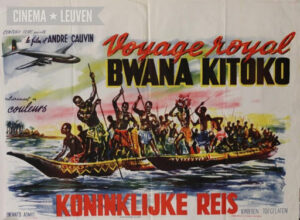I am currently at work on two projects:

“Connections between European pro-empire films and Nazi propaganda: A case study of André Cauvin’s Bwana Kitoko in comparison with Leni Riefenstahl’s Triumph of the Will.”
This research project examines Belgian director André Cauvin’s 1955 colonialist propaganda film Bwana Kitoko in comparison with German Leni Riefenstahl’s Triumph of the Will (1935). To what degree were Belgian colonialist films influenced by Nazi propaganda techniques, and perhaps even Nazi ideology?
I hope to get at yet-undiscovered legacies of the Nazi era and Nazi ideology in post-World War II Europe. Many still view the year 1945 as a clean break, as suggested by the title of Ian Buruma’s 2013 book Year Zero (Penguin). Yet historians have discovered many elements of the Nazi era that endured well beyond the collapse of the Third Reich in 1945, for example, that by 1952, one in three Foreign Ministry officials in West Germany were former members of the Nazi Party. There is an extensive literature on post-war Belgium and the legacies of fascism, Nazi occupation, resistance, and collaborationism in that country. By examining possible cultural inheritances from the Nazi era in the realm of imperialistic propaganda about Belgium’s overseas empire in central Africa, this research will extend existing scholarship into unchartered territory.
An Epic Island: The Untold Story of Mallorca in World History.

This book recounts the captivating story of Mallorca while simultaneously exploring several major themes of European and world history.
Why Mallorca? This beautiful Mediterranean isle has been and continues to be a major yet largely little-known crossroads of exchange. A small, isolated, and unpopulated landmass at the end of the Neolithic Age, the island fell successively under Carthage, Rome, Vandals, Moors, the Kingdom of Aragon, and finally Spain. In recent decades it has come to personify globalization. Mallorca today welcomes millions of tourists each year, and its inhabitants include native Mallorcans (including Roma), Spaniards from the mainland, and immigrants from across the European Union, South America, China, and the Maghreb. The rapid growth of the tourist industry has led to great prosperity on the island, while accompanied by environmental degradation and overexploitation of natural resources.
Based on cutting-edge scholarship, An Epic Island tells a series of entertaining but powerful stories as lead-ins to penetrating explanations of major European or world-historical developments including:
- The emergence of anatomically modern human beings and the transition from hunting and gathering to agriculture, i.e., the Neolithic Revolution.
- Ancient Greece’s profound influence on Roman culture, and the incredible longevity and stability of Roman rule in the Mediterranean; in Mallorca, it lasted some 550 years.
- The Reconquista of Iberia and the Balearic Islands; how this reconquest continued in altered form during the Age of Discovery; and the enduring Arab-Muslim influence on Spanish and European languages, cultures, agriculture, art, architecture, even food.
- The power of the Catholic Church during the Medieval era and European antisemitism, manifested in massacres and autos-da-fé of Mallorca’s Jews.
- The great overseas Spanish empire and the debate over whether it was actually Spanish, a historiographical argument that underscores the hazards of projecting our present-day understandings of the world back onto the past.
- Eighteenth-century Franco-British rivalry for global empire and the devastating impact of the Napoleonic wars on Europe and its peoples, seen in the scandal of French POWs imprisoned on Cabrera off Mallorca’s coast.
- The transformation of Europe resulting from nineteenth-century industrialization and urbanization, including the building of railways on Mallorca and the remaking of urban space in Palma.
- The Spanish Civil War as preview of World War II, and Franco’s dictatorship as an illustration of regionalism and nationalism in European history.
- Post-World War II tourism, the rise of the service sector, immigration, and environmental threats.

Along the way, readers learn of the peoples of Mallorca, its languages, politics, arts, and cuisine (olives, sobrassada, coca de trampó, and porc negre, or Black Majorcan Pig), and everyday life on this jewel of an island in the Mediterranean.
